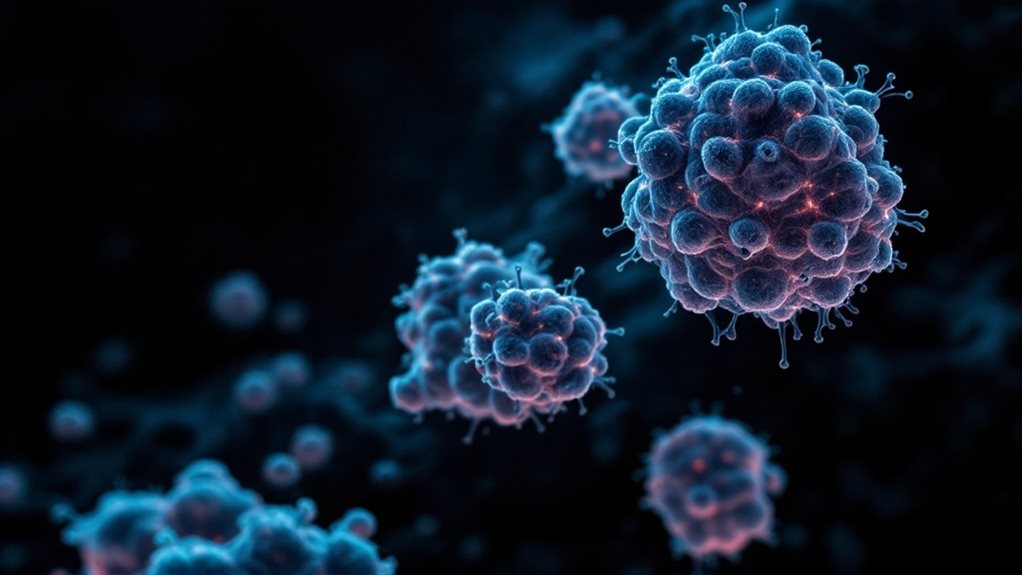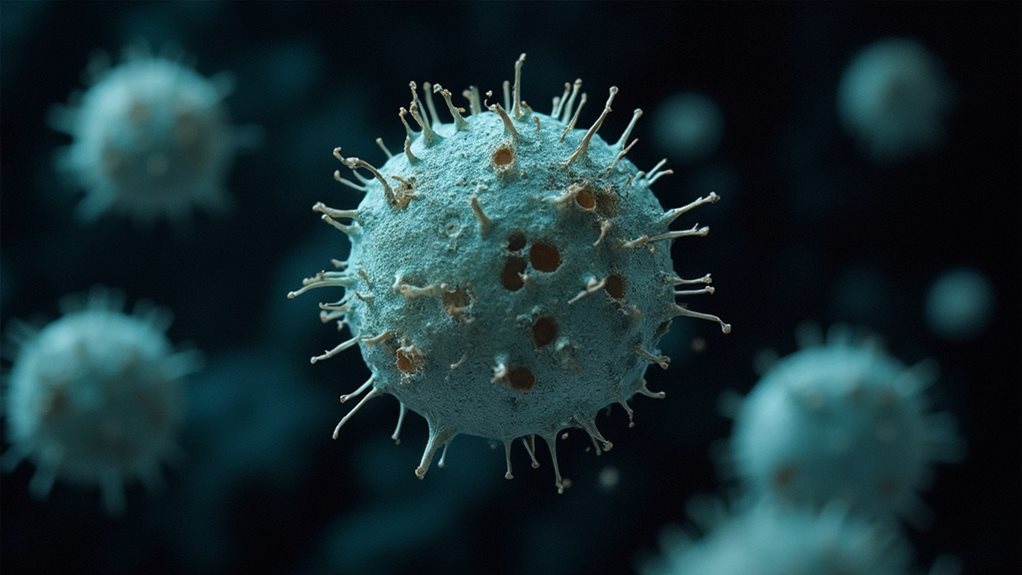
Starving cancer cells via strategic deprivation of essential nutrients such as glucose and glutamine disrupts their metabolic flexibility, thwarting their growth and survival capacities. This approach leverages the Warburg effect, wherein cancer cells overly depend on glycolysis, rendering them vulnerable to energy source manipulations. By targeting these metabolic pathways, therapeutic strategies introduce nutritional stress, diminishing tumor viability and enhancing the efficacy of conventional treatments. Further exploration can reveal how adjustments in dietary practices might bolster this effect.
Key Takeaways
- Nutritional stress limits glucose and glutamine, essential for cancer cell survival and proliferation.
- Targeting metabolic pathways can disrupt cancer cells' energy production and growth.
- Autolytic cannibalism reduces tumor viability by causing cells to consume themselves under nutrient deprivation.
- Monitoring the Glucose Ketone Index (GKI) optimizes metabolic therapy by balancing glucose and ketones.
- Combining nutrient deprivation with conventional therapies enhances the overall effectiveness against cancer.
Understanding the Warburg Effect and Its Impact on Cancer Metabolism

Although first observed by Otto Warburg in the 1920s, the Warburg effect remains a cornerstone in understanding cancer metabolism. This phenomenon involves cancer cells preferentially using glycolysis over oxidative phosphorylation for energy production, even in oxygen-rich conditions.
This shift, termed metabolic reprogramming, allows for rapid energy generation and biomass accumulation, facilitating faster cell division and growth. Warburg adaptations are not merely deviations but strategic modifications that enhance survival and proliferation.
The Role of Glutamine and Glucose in Cancer Cell Growth
Building on Otto Warburg's observations regarding cancer metabolism, it is clear that beyond glycolysis, glutamine and glucose play significant roles in supporting the rapid proliferation of cancer cells.
Glutamine metabolism is essential as it provides nitrogen and carbon for biosynthetic processes and energy production. Similarly, glucose utilization through aerobic glycolysis, despite the availability of oxygen, meets the massive energy demands of growing tumors.
This metabolic reprogramming, where cancer cells preferentially consume glutamine and glucose, underlines their vulnerability. Targeting these pathways disrupts their metabolic flexibility, offering potential therapeutic avenues to impair cancer cell growth and survival effectively.
Nutritional Stress as a Strategy to Combat Cancer

Nutritional stress, strategically imposed by restricting key nutrients like glucose and glutamine, presents a formidable challenge to cancer cells, which are often ill-equipped to adapt to such severe deprivation.
This approach leverages the inherent metabolic inflexibility of cancer cells, relying heavily on these substrates for survival and proliferation. By inducing nutritional deprivation, healthy cells can outcompete cancerous ones, exploiting the latter's limited metabolic adaptation capabilities.
Research indicates that such targeted deprivation disrupts cancer cell energy homeostasis, impairing their growth and viability.
This strategic starvation not only curtails cancer cell proliferation but also enhances the efficacy of conventional treatments.
The Significance of Autolytic Cannibalism in Reducing Tumor Viability
While nutritional stress targets cancer cells by restricting their energy sources, another intriguing approach involves autolytic cannibalism, where cells consume themselves or neighboring cells, thereby reducing tumor viability.
This phenomenon, leveraging autolytic mechanisms, facilitates cellular recycling, providing an efficient means to degrade and repurpose cellular components.
Such mechanisms not only curtail tumor growth by depriving malignant cells of essential nutrients but also enhance the metabolic efficiency of surrounding healthy tissues.
This strategy showcases a crucial adaptive response, turning internal cellular crises into a self-cleansing process that undermines cancer's survival and proliferation capabilities, marking a significant stride in oncological research.
Utilizing the Glucose Ketone Index (GKI) in Cancer Management

As researchers explore deeper into the metabolic peculiarities of cancer cells, the Glucose Ketone Index (GKI) emerges as an essential tool in cancer management. GKI monitoring facilitates precise assessment of metabolic therapy effects by quantifying the balance between glucose and ketones. This balance is pivotal in creating an unfavorable environment for cancer cells, which primarily thrive on glucose. Strategic adjustments based on GKI readings can enhance the efficacy of metabolic therapies, tailored to individual metabolic responses.
| Aspect | Benefit |
|---|---|
| GKI Monitoring | Tailored therapeutic adjustments |
| Glucose Control | Limits fuel for cancer cells |
| Ketone Measurement | Indicates metabolic therapy success |
| Real-time Feedback | Allows dynamic treatment planning |
| Personalized Approach | Optimizes patient-specific strategies |
Dietary Interventions to Lower the Glucose Ketone Index
To effectively lower the Glucose Ketone Index (GKI), dietary interventions play a pivotal role in shifting the primary energy source from glucose to ketones, thereby starving cancer cells of their preferred fuel.
Adopting ketogenic dietary patterns enhances metabolic flexibility, allowing healthy cells to thrive on ketones while cancer cells falter. This strategy leverages the body's ability to adjust its metabolic pathways, reducing reliance on glucose.
Implementing Fasting and Nutritional Supplements in Cancer Therapy

Building upon the foundational role of dietary interventions in cancer therapy, fasting and the strategic use of nutritional supplements have emerged as potent tools in managing cancer metabolically.
The fasting benefits are multifaceted, primarily enhancing the efficacy of conventional treatments by inducing nutritional stress that cancer cells cannot easily withstand.
Strategic supplement choices, including antioxidants and omega-3 fatty acids, complement fasting by potentially mitigating inflammation and reinforcing cellular defense mechanisms.
Research indicates that such interventions, when carefully coordinated, can disrupt cancer cell metabolism, thereby reducing tumor growth and enhancing patient outcomes.
This approach necessitates rigorous clinical evaluation to optimize therapeutic protocols.
Frequently Asked Questions
How Do Cancer Cells Adapt to Long-Term Metabolic Restrictions?
Cancer cells exhibit metabolic flexibility by adjusting their nutrient reliance, enhancing their adaptation to long-term metabolic restrictions. They alter energy pathways and nutrient absorption, countering the effects of targeted therapies and environmental stressors.
Can Cancer Metabolism Therapies Be Combined With Traditional Treatments?
Combining cancer metabolism therapies with traditional treatments, known as therapeutic combinations, can enhance metabolic synergy. Studies show a 40% increase in efficacy, suggesting a potentiated approach against tumor growth and progression.
What Are the Risks of Targeting Cancer Cell Metabolism?
Targeting cancer cell metabolism risks include reduced metabolic flexibility and potential therapeutic resistance. This approach may lead to compensatory metabolic pathways in cancer cells, diminishing treatment efficacy and possibly promoting more aggressive phenotypes.
Are There Genetic Factors That Affect Cancer Cell Metabolism?
Genetic mutations markedly influence cancer cell metabolism by altering metabolic pathways. These genetic variations dictate how cancer cells process energy, impacting their growth and survival, underscoring the importance of genetic profiling in cancer treatment strategies.
How Do Patients Typically Respond to Dietary Changes in Cancer Therapy?
Patients typically exhibit varied responses to dietary changes in cancer therapy, influenced by personal dietary preferences and patient compliance. Effective adaptation depends on individual health conditions and the ability to adhere to prescribed nutritional guidelines.
Conclusion
Innovative metabolic-focused therapies, such as manipulating the glucose ketone index (GKI), are pioneering shifts in cancer treatment. By implementing dietary interventions that lower the GKI, researchers are seeing promising results. Studies reveal that a ketogenic diet can reduce glucose levels by 50%, markedly impairing cancer cell metabolism and growth. This evidence-based approach underscores the potential of dietary strategies to not only complement traditional treatments but also to open new avenues for targeting the unique vulnerabilities of cancer cells.

